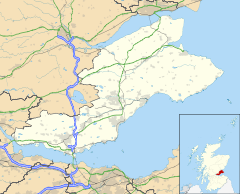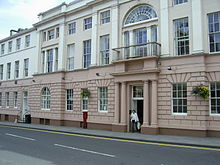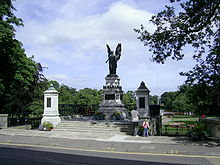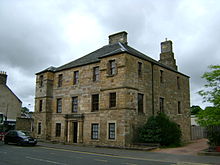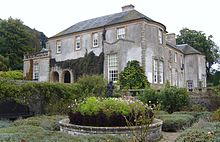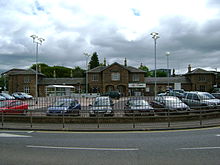- Cupar
-
Coordinates: 56°19′10″N 3°00′42″W / 56.31940°N 3.01155°W
Cupar Scottish Gaelic: Cupar [1] 
Cupar seen from the summit of nearby Tarvit Hill
 Cupar shown within Fife
Cupar shown within FifePopulation 8,980 [2] OS grid reference NO374146 Council area Fife Lieutenancy area Fife Country Scotland Sovereign state United Kingdom Post town CUPAR Postcode district KY14 - 15 Dialling code 01334 Police Fife Fire Fife Ambulance Scottish EU Parliament Scotland UK Parliament North East Fife Scottish Parliament North East Fife List of places: UK • Scotland • Cupar (
 listen (help·info); Scottish Gaelic: Cupar) is a town and former royal burgh in Fife, Scotland. The town is situated between Dundee and the New Town of Glenrothes.
listen (help·info); Scottish Gaelic: Cupar) is a town and former royal burgh in Fife, Scotland. The town is situated between Dundee and the New Town of Glenrothes.According to a recent population estimate (2006), Cupar had a population around 8,980 making the town the ninth largest settlement in Fife.
Contents
History
The town is believed to have grown around the site of Cupar Castle, which was the seat of the sheriff and was owned by the earls of Fife.[3] The area became a centre for judiciary as the county of Fife and as a market town catering for both cattle and sheep.[4]
Towards the latter stages of the 13th century, the burgh became of great importance staging the site of an assembly of the three estates - clergy, nobility and burgesses - organised by Alexander III in 1276 as a predecessor of the Parliament of Scotland.[4] Although, written information of a charter for the modern town was lost, evidence has suggested that this did exist as one of the many properties owned by the Earls of Fife by 1294.[3]
During the middle of the 14th century, the burgh started to pay customs on taxable incomes, which probably meant that royal burgh status was gifted sometime between 1294 and 1328.[3] The oldest document, referring to the royal burgh, was a grant by Robert II in 1381 to give a port at Guardbridge on the River Eden for the residents of the burgh to help boost trade with Flanders.[5] This grant was officially recognised by James II in 1428.[5]
Governance
Cupar is represented by several tiers of elected government. Cupar Community Council form the lowest tier of governance whose statutory role is to communicate local opinion to local and central government. Fife Council, the unitary local authority for Cupar, based in Glenrothes is the executive, deliberative and legislative body responsible for local governance.[6] The Scottish Parliament is responsible for devolved matters such as education, health and justice while reserved matters are dealt with by the Parliament of the United Kingdom.[6] The Cupar area supports three multi-member wards with eleven councillors sitting on the committee of Fife Council.[7] The County Buildings on Catherine Street are the main headquarters for the east region of Fife Council, which deals with administrative, planning and agricultural issues.[8]
Cupar forms part of the North East Fife, electing one Member of Parliament (MP) to the House of Commons of the Parliament of the United Kingdom by the first past the post system. The constituency is represented by Sir Menzies Campbell, MP of the Scottish Liberal Democrats.[9] For the purposes of the Scottish Parliament, Cupar forms part of the North East Fife constituency. The North East Fife Scottish Parliament (or Holyrood) constituency created in 1999 is one of nine within the Mid Scotland and Fife electoral region.[10] Each constituency elects one Member of the Scottish Parliament (MSP) by the first past the post system of election, and the region elects seven additional members to produce a form of proportional representation. The constituency is represented by Rod Campbell for the SNP.[11]
At EU level, Cupar is part of the pan-Scotland European Parliament constituency which elects seven Members of the European Parliament (MEP)s using the d'Hondt method of party-list proportional representation.[12] Currently, Scotland returns two Labour MEPs, two Conservative and Unionist MEPs, two SNP MEPs and one Liberal Democrat MEP, to the European Parliament.[12]
Demography
Cupar compared according to UK Census 2001[13][14][15][16] Cupar Fife Scotland Total population 8,506 349,429 5,062,011 Foreign born 1.60% 1.18% 1.10% Over 75 years old 10.29% 7.46% 7.09% Unemployed 3.10% 3.97% 4.0% According to the 2001 census, Cupar had had a total population of 8,506.[13] The population of Cupar has since increased slightly to around 8,980 in 2008.[2] The demographic make-up of the population is much in line with the rest of Scotland. The age group from 30 to 44 forms the largest portion of the population (22%).[13] The median age of males and females living in Cupar was 39 and 43 years respectively, compared to 37 and 39 years for those in the whole of Scotland.[13]
The place of birth of the town's residents was 95.81% United Kingdom (including 81.64% from Scotland), 0.51% Republic of Ireland, 1.60% from other European Union countries, and 2.09% from elsewhere in the world.[13] The economic activity of residents aged 16–74 was 42.20% in full-time employment, 12.32% in part-time employment, 5.89% self-employed, 3.10% unemployed, 2.96% students with jobs, 3.94% students without jobs, 17.68% retired, 4.83% looking after home or family, 4.35% permanently sick or disabled, and 2.72% economically inactive for other reasons.[15] Compared with the average demography of Scotland, Cupar has low proportions of people born outside the United Kingdom but has higher proportions for people over 75 years old.[15]
Landmarks
The historic hub of the town centre, is the junction of Bonnygate and the Crossgate. This is where the town's mercat cross which dates from 1683 is located with the original shaft being supported by a unicorn.[5] To the east is St Catherine Street, is home to the burgh chambers and county buildings, both designed by Robert Hutchison.[5] The Category B[17] listed burgh chambers built around 1815 and 1818 contain a three storey bow street corner and a robust domic entrance.[5] The adjacent Category B[18] listed county buildings built between 1812 and 1817 are unique in Fife for being the only example replicating the style of buildings in the New Town of Edinburgh.[5][19] The Category B listed tower of the corn exchange can be seen across the skyline of the town.[5]
At the east end of St Catherine Street is the Category B[20] listed Cupar War Memorial in a classical Greek style overlooking the Cart Haugh, one of several to be designed by John Kinross with assistance from leading contemporary sculptors, for the exception of the Victory statue which was done by HS Gamby.[5] The memorial was first unveiled by Field Marshal Earl Haig in 1922 and then again for the addition of the World War II memorial in 1950 by the Earl of Elgin.[20] Nearby on Coal Road is a former Category B[21] listed classical style prison building built between 1813 and 1814.[5]
On the bonnygate, the Category A[22] listed Preston Lodge built by the Laird of Airdrie is the second oldest building in the town.[5][23] The date of 1623, when the house was first built, is inscribed on a stone on the west wall.[23] The house was extended in 1702 by James Preston and was remodelled by William Preston, a London goldsmith in 1765.[23] Later, the Reverend Sir James Preston occupied the house between 1775 and 1791, when he was the minister of the Cupar Old Parish Church.[23] The original design of the building is believed to have been inspired by Culross Palace in Culross.[5] Situated at the corner of the Crossgate, the Category C(s)[24] Listed Duncan's institute was built around 1870-71 as a mechanics' institute for the "working classes of Cupar" by Mrs Duncan.[5] The building, a mixture of Gothic, Scottish and Flemish styles is recognised in the town for having a twisted spire.[5] On the Kirkgate, is the Parish Church of Cupar Old and St Michael of Tarvit, designed by the architect, Hay Bell.[5] This consists of the Category A[25] listed Parish Church tower dating from 1415 and the Category B listed main church building from 1745.[5] The tower is the only surviving piece of the old Cupar parish church, founded by the priory of St Andrews.[5][26]
To the south of the town on the A914 and A916 is the Category A[27] listed Hill of Tarvit mansion house and nearby Category A[28] listed Scotstarvit Tower.[29] The Hill of Tarvit was formerly known as Wemyss Hall, designed by Sir Walter Bruce around 1692.[30] When the house was sold in 1904, Robert Lorimer was commissioned to design a bigger house in size compared to the existing Wemyss Hall to be able to hold the owner's French architecture.[30] This was completed around 1907 and 1908, granting the present name Hill of Tarvit.[30][31] The interior of the house which showcased the owner's love of antique furniture ranging from Flemish tapestries; Louis V; Louis XI; English and Scottish have been considered by many to be Lormier's best work.[30] The service accommodation is the most fascinating aspects of the house which shows the range of rooms and equipment used by a family, prior to the First World War.[30] Situated between the Tarvit and Walton Hills, is Scotstarvit Tower, a well-preserved simple L-plan early 17th century tower house of five stories and an attic.[29]
Economy
Fife Council is the largest employer in the area whilst many people are employed in food and drink, with the larger employers being Kettle Produce (fruit and vegetable producer) and Fishers Services Ltd. Other employers include: Elmwood College (Fife education); Scotsfruit Ltd (food and drink); Quaker Oats Ltd (food and drink) and Fisher and Donaldson (food and drink). There are 72% people employed in the town with unemployment below the national average at 2.1%.[32] The main shopping facilities are also located mainly here with a majority of family-owned businesses and some chain stores. Under the Cupar and Howe of Fife local plan, there is a proposal to upgrade shopping facilities in the town for the aim to become a secondary retail area in Fife.[32]
Sport, recreation & hobbies
Cupar has an unusual golf course on the side of a hill to the South of the town. Stratheden, a large psychiatric hospital is located nearby.
Cupar Sports Centre has a 25 metre Swimming pool, badminton courts, squash courts and a fitness suite.[33] Cupar is also home to Cupar Cricket Club, founded in 1884 the club is celebrating its 125th anniversary in the 2009 season.
The Castlehill Community Association is home to a variety of local groups including Cupar Camera Club, Cupar Art Club, Cupar & District Model Railway Club. They operate from the Old Castlehill Primary School and from 11 St Catherine Street.
Education
Today, Cupar is home to one secondary school and two primary schools.[34][35] Castlehill Primary School which opened to pupils in 1975 is located on the outskirks of the town and has a school role of 420.[36]
Bell Baxter High School located on Carslogie Road, serves both the town and surrounding villages. The School role recorded in February 2009, was estimated at 1620 pupils.[37] Elmwood College has three main campuses situated in the town and surrounding area. The college has been praised as a centre for excellence in golf-related studies and being a specialist in land-based education. Local businesses also benefit from the work of the Elmwood Rural Business Centre.[32]
Transport
A express bus service connects the town every hour between Edinburgh and St Andrews and also between Glasgow and St Andrews. Other services run less frerquently from Stirling and various local villages through Cupar to St Andrews. An express service also runs via the town from Ladybank to Dundee. A railway station can be found to the south-east of the town centre. The station is situated on the East Coast Main Line, served by Scotrail and Arriva CrossCountry with regular services running between Edinburgh Waverley and Aberdeen. Nearby stations are located to the north-east of the town at Leuchars and to the south of the town in neighbouring Springfield (limited service) and Ladybank. The nearest major international airport is in Edinburgh airport with the nearest ferry sea port at Rosyth being 42 miles and 35 miles, respectively.[32]
Notable people
- Colonel Robert Hope Moncrieff Aitken VC (1826 – 1887), recipient of the Victoria Cross during the Indian Mutiny, was born in Cupar.[38]
References
Notes
- ^ Ainmean-Àite na h-Alba ~ Gaelic Place-names of Scotland
- ^ a b "Mid-2008 Population Estimates – Localities in order of size". General Register Office for Scotland. 2008. http://www.gro-scotland.gov.uk/files2/stats/population-estimates/08mye-localities-table2.xls. Retrieved 2010-09-08.
- ^ a b c Martin, Paula Cupar: The history of a small Scottish town pp9–10
- ^ a b Lamont-Brown, Raymond Fife in History and Legend p49
- ^ a b c d e f g h i j k l m n o p Pride Kingdom of Fife pp106–111
- ^ a b "Reserved and devolved matters". Scotland Office. http://www.scotlandoffice.gov.uk/what-we-do/reserved-and-devolved-matters.html. Retrieved 2010-02-24.[dead link]
- ^ "Cupar's councillors". Fife Council. http://www.fife.gov.uk/orgs/index.cfm?fuseaction=councillor.all&orgid=60304273-A856-11D6-BF4D0002A5349AC9&contentid=A1520B22-9012-4485-ACC5CD065A028EEB. Retrieved 2008-01-11.
- ^ "County Buildings, headquarters of the East Region". Fife Council. http://www.fifedirect.org.uk/topics/index.cfm?fuseaction=facility.display&subjectid=104CC166-3ED1-4D22-B9F1E2FB8438478A&FacId=00A35632-8821-4761-9D55D7B55795ED9D. Retrieved 2008-01-11.
- ^ "Menzies Campbell, MP for North East Fife". BBC News. http://news.bbc.co.uk/democracylive/hi/representatives/profiles/25795.stm. Retrieved 2011-02-14.
- ^ "Regional MSPs for Mid Scotland and Fife". Scottish Parliament. http://www.scottish.parliament.uk/msps/locate/con-east.htm. Retrieved 2010-01-06.
- ^ "MSP for North East Fife". Scottish Parliament. http://www.scottish.parliament.uk/msp/membersPages/roderick_campbell/index.htm. Retrieved 2011-06-24.
- ^ a b "UK MEPs - Scotland". European Parliament. Archived from the original on 2006-10-07. http://web.archive.org/web/20061007155610/http://www.europarl.org.uk/uk_meps/scot.asp. Retrieved 2011-02-14.
- ^ a b c d e "Comparative Populartion: Cupar Locality Scotland". scrol.co.uk. 2001. http://www.scrol.gov.uk/scrol/browser/profile.jsp?profile=Population&mainLevel=Locality&mainText=Cupar&mainTextExplicitMatch=false&compLevel=CountryProfile&compText=&compTextExplicitMatch=null. Retrieved 2008-11-25.
- ^ "Comparative Population Profile: Fife Council Area Scotland". scrol.gov.uk. 2001. http://www.scrol.gov.uk/scrol/browser/profile.jsp?profile=Population&mainLevel=CouncilArea&mainArea=Fife&mainText=&mainTextExplicitMatch=false&compLevel=CountryProfile&compText=&compTextExplicitMatch=null. Retrieved 2008-11-25.
- ^ a b c "Comparative Employment Profile: Cupar Locality Scotland". scrol.gov.uk. 2001. http://www.scrol.gov.uk/scrol/browser/profile.jsp?profile=Employment&mainLevel=Locality&mainText=Cupar&mainTextExplicitMatch=false&compLevel=CountryProfile&compText=&compTextExplicitMatch=null. Retrieved 2008-11-25.
- ^ "Comparative Employment Profile: Fife Locality Scotland". scrol.gov.uk. 2001. http://www.scrol.gov.uk/scrol/browser/profile.jsp?profile=Employment&mainLevel=CouncilArea&mainArea=Fife&mainText=&mainTextExplicitMatch=false&compLevel=CountryProfile&compText=&compTextExplicitMatch=null. Retrieved 2008-11-25.
- ^ "Historic Scotland: County Buildings listed report". Historic Scotland. http://hsewsf.sedsh.gov.uk/hslive/hsstart?P_HBNUM=24160. Retrieved 2011-03-05.
- ^ "Historic Scotland: County Buildings listed report". Historic Scotland. http://hsewsf.sedsh.gov.uk/hslive/hsstart?P_HBNUM=24161. Retrieved 2011-03-05.
- ^ Omand, Donald The Fife Book p200
- ^ a b "Cupar War Memorial". Historic Scotland. http://hsewsf.sedsh.gov.uk/hslive/hsstart?P_HBNUM=46365. Retrieved 2011-03-05.
- ^ "Historic Scotland: Watts listed report". Historic Scotland. http://hsewsf.sedsh.gov.uk/hslive/hsstart?P_HBNUM=24290. Retrieved 2011-03-05.
- ^ "Historic Scotland: Preston Lodge listed report". Historic Scotland. http://hsewsf.sedsh.gov.uk/hslive/hsstart?P_HBNUM=24242. Retrieved 2011-03-05.
- ^ a b c d Boyd Cupar: In Old Picture Postcards Volume 2 p.32.
- ^ "Historic Scotland: Duncan Institute listed report". Historic Scotland. http://hsewsf.sedsh.gov.uk/hslive/hsstart?P_HBNUM=24180. Retrieved 2011-03-05.
- ^ "Historic Scotland: Parish Church of Cupar Old and St Michael of Tarvit listed report". Historic Scotland. http://hsewsf.sedsh.gov.uk/hslive/hsstart?P_HBNUM=24136. Retrieved 2011-03-05.
- ^ Omand The Fife Book p.134.
- ^ "Historic Scotland: Hill of Tarvit listed report". Historic Scotland. http://hsewsf.sedsh.gov.uk/hslive/hsstart?P_HBNUM=2628. Retrieved 2011-03-05.
- ^ "Scotstarvit tower". Historic Scotland. http://hsewsf.sedsh.gov.uk/hslive/hsstart?P_HBNUM=2416. Retrieved 2008-12-20.
- ^ a b Walker and Ritchie Fife, Perthshire and Angus p.106.
- ^ a b c d e Walker and Ritchie Fife, Perthshire and Angus p.89.
- ^ Pride Kingdom of Fife p.92.
- ^ a b c d "Cupar and Howe of Fife Economic Profile" (PDF). Fife Council. Spring 2007. http://www.fife.gov.uk/uploadfiles/publications/c64_Cuparprofile.pdf. Retrieved 2008-12-04.
- ^ "Cupar Sports Centre". Fife Council Community Services. 2001. http://www.fifestyle.co.uk/leisure/cupar.htm. Retrieved 2009-02-26.
- ^ "A list of all primary schools in Fife". Fife Council. http://www.fifedirect.org.uk/topics/index.cfm?startRow=1&OBJECTID=xxx&ORDERBY=location&FUSEACTION=Facility%2EList&SUBJECTID=0AB411F8%2D508B%2DDE79%2D478BA07C673E89C9. Retrieved 2010-02-28.
- ^ "A list of all secondary schools in Fife". Fife Council. http://www.fifedirect.org.uk/topics/index.cfm?fuseaction=Facility.List&subjectid=EC1C63EC-508B-DE79-470C9585EF1932A4&objectid=xxx&orderby=location. Retrieved 2010-02-28.
- ^ "Castlehill Primary School". Fife Council. http://www.fifedirect.org.uk/atoz/index.cfm?fuseaction=facility.display&facid=9205D7E8-FDF1-4C34-958C906B3357A469. Retrieved 2010-03-03.
- ^ "Bell Baxter High School 2009 Inspection". HMIE. http://www.hmie.gov.uk/documents/inspection/BellBaxterHS5426332.html. Retrieved 2010-03-02.
- ^ "Robert Hope Moncrieff Aitken". victoriacross.org.uk. http://www.victoriacross.org.uk/scofife.htm. Retrieved 2011-11-18.
Bibliography
- Omand, Donald (2000). The Fife Book. Birlinn Publishing.
- Pride, Glen L. (1999). Kingdom of Fife (2nd edition ed.). The Rutland Press.
- Lamont-Brown, Raymond (2002). Fife in History and Legend. Edinburgh: John Donald. ISBN 0859765679.
- Martin, Paula (2006). Cupar: The History of a small Scottish town. Edinburgh: Birlinn Publishing.
External links
Categories:- Cupar
- Royal burghs
- Scottish county towns
- Towns in Fife
Wikimedia Foundation. 2010.

